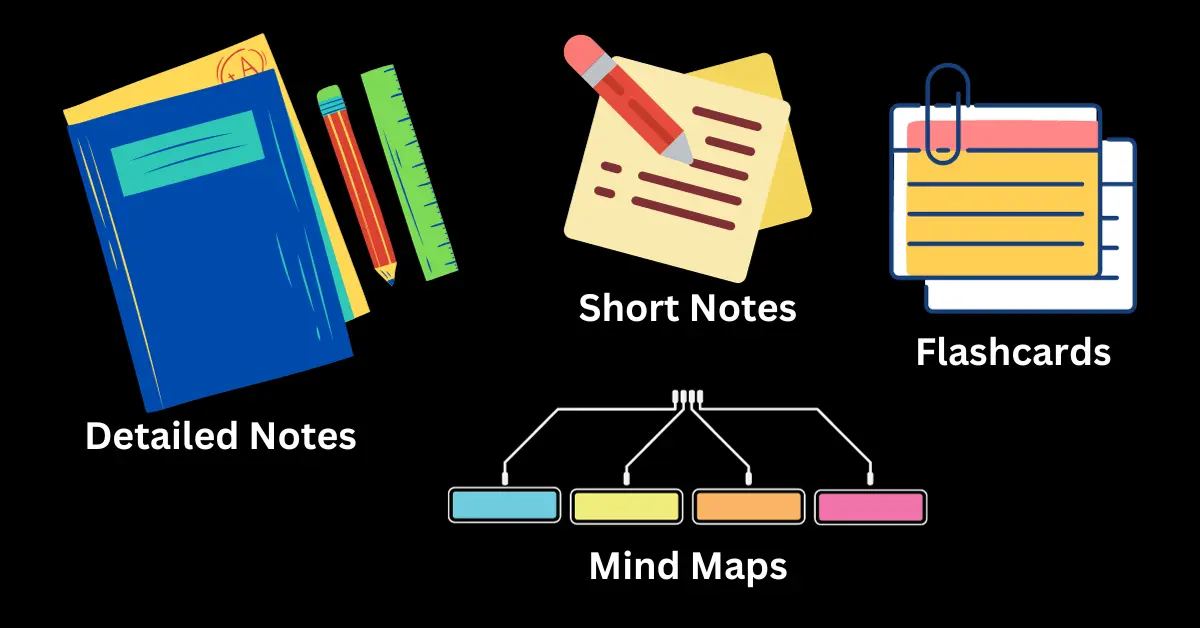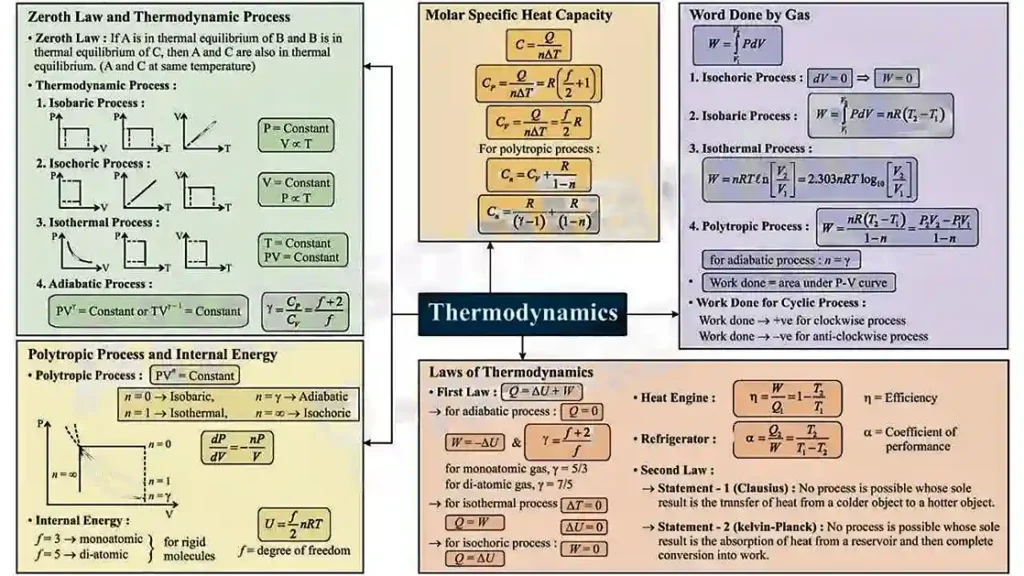When preparing for the NEET exam, aspirants are confused and do not know which type of notes are best for NEET according to the subject, whether they should prepare detailed notes or short notes.
Choosing the correct type of notes is a crucial decision that aspirants must take.
Don’t worry; in this article, I will discuss the different types of notes that you should prepare according to the subject and your personal preference, as well as the pros and cons of the different types of notes.
Read Also: Is it important to make notes for NEET?
Which Type of notes are best for NEET aspirants?

- Detailed Notes
- Short Notes
- Flashcards
- Mind Maps
1. Detailed Notes
Detailed notes are comprehensive and in-depth study material. These notes cover every minute detail, explanations including solved problems.
These notes can be extremely beneficial for NEET aspirants as they provide a thorough and clear explanation of complex topics.
Pros
1. Comprehensive: Includes detailed information and provides an in-depth understanding of the subject.
2. Clarity: Offers a clear and easy explanation of the concepts.
Cons
1. Time-Consuming: Creating detailed notes takes a lot of time, leaving less time for other study activities.
2. Information Overload: Detailed notes contain too much information, which can be overwhelming sometimes.
Read Also: How to make notes from NCERT for NEET?
2. Short Notes
Short notes are concise study materials that are prepared from various study materials like books, detailed notes, etc.
Short notes include a summary of key concepts, important points, formulas, diagrams, etc. These notes are extremely useful for revision.
Pros
1. Concise: Short notes focus on essential key points, making them easy to review quickly.
2. Quick Revision: It is ideal for last-minute revisions.
Cons
1. Lack Of Depth: Short notes lack the depth of information as compared to detailed notes.
2. Not suitable for complex topics: Short notes are not suitable for subjects or topics that are too complex; these topics require a detailed explanation.
Read Also: How to make short notes for NEET Physics?
3. Flashcards

Flashcards are cards which have information on both sides.
On one side of the flashcard, there is a question, and on the other side, there is the answer to the question.
NEET aspirants mainly use flashcards for memorization.
Pros
1. Ideal for memorization: Flashcards are highly effective in memorizing formulas, terminology, definitions, etc.
2. Interactive learning: Flashcards are highly interactive, allowing you to quiz yourself and track your progress
Cons
1. Limited Depth: Flashcards may lack the depth of information required for complex topics.
2. Time-Consuming: Creating flashcards takes a lot of time, as you may spend more time creating them rather than studying them.
4. Mind Maps
A mind Map is a diagram in which information is visually represented. In a mind map, usually, the central idea is placed in the middle, and associated ideas are arranged around it.
Mind Maps consist of images, diagrams, drawings, etc. Mind Maps help NEET aspirants to break down and simplify complex topics.
Pros
1. Simplified Learning: A visual diagram simplifies a complex topic.
2. Effective For Revision: Mind Maps are an excellent visual aid for revision.
Cons
1. Not Ideal For All Topics: Mind Maps may not be useful for topics that mainly rely on textual information
2. Time-Consuming: Creating a detailed and elaborate mind map can be time-consuming
Choose notes for NEET according to the subject
Aspirants should note that notes for every subject are not the same. Now let us discuss which type of notes you should prepare according to the subject.
1. Physics & Chemistry
As Physics and Chemistry are less theoretical, detailed notes may not be necessary for you. NCERT books, short notes or any standard book is sufficient. Flashcards and Mind maps are also useful, but it is optional.
2. Biology
As Biology is more theoretical than Physics and Chemistry, detailed notes are a must. Short notes, flashcards and mind maps are extremely beneficial, but it is optional.
Choose notes for NEET according to your personal preference
We have discussed the different types of notes as well as their pros and cons. Now let us discuss which type of notes you should prepare according to your personal preference.
1. Learning style: If you are a visual learner, then flashcards and mind maps will be very useful for you.
2. Time management: If you struggle to manage time, then please avoid making flashcards and mind maps. Detailed notes or short notes along with standard books you should opt for.
Benefits of well-chosen notes for NEET
Choosing the correct type of notes can be extremely beneficial for a NEET aspirant. Now, let us discuss some of the benefits of choosing the right type of notes.
1. Easier To Remember: Notes can be extremely beneficial for you as notes help you to remember formulas, concepts, etc.
2. Clarity: You can understand complex topics with the help of clear and concise notes with ease.
3. Effective Revision: Revision is one of the most important tasks that a NEET aspirant must do. You can effectively revise with well-organized notes.
Conclusion
As we have discussed the various types of notes as well as its pros and cons in this article. The final decision to choose which type of notes you should prepare is up to you.
You should analyze the pros and cons of the various types of notes discussed in this article, as well as your personal preference.
When deciding Which type of notes you should choose, consider two factors: the pros and cons of each type of notes and your personal preference.
These two factors will help you decide which type of notes you should prepare for NEET.
Frequently Asked Questions
Q1. Which notes are best for NEET?
Notes based on NCERT have been proven to always work in favor of NEET aspirants.
Q2. How often should I revise my notes for NEET?
Revision is a must to achieve success in the NEET exam. Revise as many times as you can; 5 to 6 times would be great.
Q3. How should I organize my notes for NEET?
Systematically organize your notes by subject, chapter and topic. Use headings, subheadings, bullet points and numbering.
Q4. Are flashcards effective for NEET?
Flashcards are extremely effective for NEET as they require active learning repetition, all of which are proven to enhance memory.
Q5. Should I rely solely on notes for NEET?
Relying solely on notes for NEET preparation is not a good idea. Notes may not cover all the topics in detail. So it is advisable to study from NCERT books or any standard book along with notes.